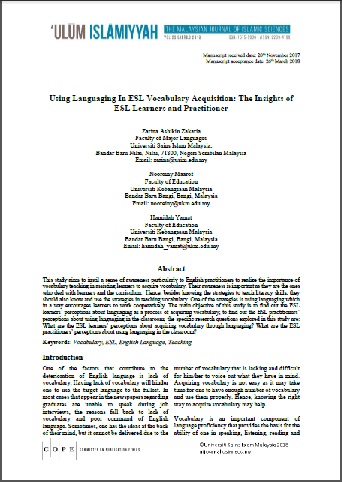Using Languaging In ESL Vocabulary Acquisition: The Insights of ESL Learners and Practitioner
DOI:
https://doi.org/10.33102/uij.vol23no0.19Keywords:
Vocabulary, ESL, English Language, TeachingAbstract
This study aims to instil a sense of awareness particularly to English practitioners to realize the importance of vocabulary teaching in assisting learners to acquire vocabulary. Their awareness is important as they are the ones who deal with learners and the curriculum. Hence, besides knowing the strategies to teach literacy skills, they should also know and use the strategies in teaching vocabulary. One of the strategies is using languaging which in a way encourages learners to work cooperatively. The main objective of this study is to find out the ESL learners’ perceptions about languaging as a process of acquiring vocabulary; to find out the ESL practitioners’ perceptions about using languaging in the classroom; the specific research questions explored in this study are: What are the ESL learners’ perceptions about acquiring vocabulary through languaging? What are the ESL practitioners’ perceptions about using languaging in the classroom?
Downloads
References
Coady, J. & Huckin, T. (eds.) 1997. Second Language Vocabulary Acquisition. Cambridge : Cambridge University Press
Creswell, J. W. 2008. Research design: Qualitative, quantitative, and mixed methods approaches(2nd ed.). Thousand Oaks, CA: Sage.
Knouzi, I., M. Swain, S. Lapkin, & L. Brooks. (2010). Self scaffolding mediated by languaging: microgenetic analysis of high and low performers. International Journal of Applied Linguistics, 20 (1). 23-49.
Nation, I.S.P. 1990. Teaching and Learning Vocabulary. Massachusetts : Heinle & Heinle Publishers.
Nunan, D. 1991. Language Teaching Vocabulary : A Textbook for Teachers. Prentice Hall
Saville-Troike, M. 2006. Introducing Second Language Acquisition. Cambridge : Cambridge University Press
Sedita, J. 2005. The key vocabulary routine : content vocabulary instruction. Keys ro Literacy
Smith, P. 1969. Teaching Vocabulary. The Modern Language Journal, 53(8). 531-537.
Storch, N. 2002. Patterns of Interaction in ESL Pair Work. Language Learning 52 (1), March 2002 ; 119-158
Swain, M. 2005. ‘The output hypothesis : theory and research’ in E.Hinkel (ed.) Handbook of Research in Second Language Teaching and Learning. Mahwah NJ :Lawrence Erlbaum, pp. 471-484
Swain, M. and Lapkin, S. 1998. Interaction ans second language learning : two adolescent French immersion students working together’. Modern Language Journal. Pp.320-327
Swain, M. & Lapkin, S. Focus on form through collaborative dialogue : Exploring task effects. In M.Bygate, P. Skehan, & M.Swain (Eds.), Researching pedagogic tasks : Second language learning, teaching and testing. London : Longman
Vygotsky, L.S. 1978. Mind in Society. The development of Higher Psychological Process. Cambridge, MA : Harvard University Press

Downloads
Published
How to Cite
Issue
Section
License
Copyright (c) 2018 Zarina Ashikin Zakaria, Nooreiny Maarof; Hamidah Yamat

This work is licensed under a Creative Commons Attribution-NonCommercial 4.0 International License.
If the article is accepted for publication, the copyright of this article will be vested to author(s) and granted the journal right of first publication with the work simultaneously licensed under the Creative Commons Attribution-NonCommercial 4.0 International License, unless otherwise stated. Anyone may reproduce, distribute, translate and create derivative works of this article (for both commercial and non-commercial purposes), subject to full attribution to the original publication and authors. The full terms of this licence may be seen at https://creativecommons.org/licenses/by-nc/4.0/.






